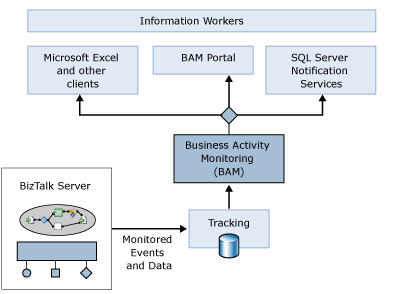BT BAM Interceptor Test
Information workers need flexibility in looking at and evaluating business processes. A purchasing manager might need to see how many POs are approved and denied each day, for example, while a sales manager might want an hourly update on what products are being ordered. Meeting these diverse needs requires a general framework for tracking what’s going on with a particular business process. This is exactly what the Business Activity Monitoring (BAM) component in Microsoft BizTalk Server provides.

Figure 1 : How does BAM work?
As the figure above illustrates, the BAM component allows monitoring of events and data produced by a BizTalk application. This information is made accessible using SOAP-callable Web services, and it can be accessed in several different ways, as follows:
- Through Microsoft Excel or other desktop clients, such as a custom dashboard application.
- Using a BAM portal, a component in BizTalk Server that enables business users to examine and configure BAM information.
- Through SQL Server Notification Services, allowing BAM information to be delivered as notifications.
The BAM Interceptor is an object that lets you instrument your application to capture data of interest. Using this test, you can monitor the BAM interceptors, and swiftly spot the failure of BAM events.
Target of the test : A BizTalk Server 2010
Agent deploying the test : An internal agent
Outputs of the test : One set of results for the BizTalk server being monitored
| Parameters | Description |
|---|---|
|
Test period |
This indicates how often should the test be executed. |
|
Host |
The host for which this test is to be configured. |
|
Port |
The port at which the host listens to. |
|
Ispassive |
If this parameter is set to Yes, then it means that, by default, all BizTalk servers being monitored by the eG system are the passive servers of a BizTalk cluster. No alerts will be generated if the servers are not running. Measures will be reported as "Not applicable" by the agent if the servers are not up. |
| Measurement | Description | Measurement Unit | Interpretation |
|---|---|---|---|
|
Total Failed Events |
Indicates the total number of failed BAM events that occured during data flush. |
Number |
|